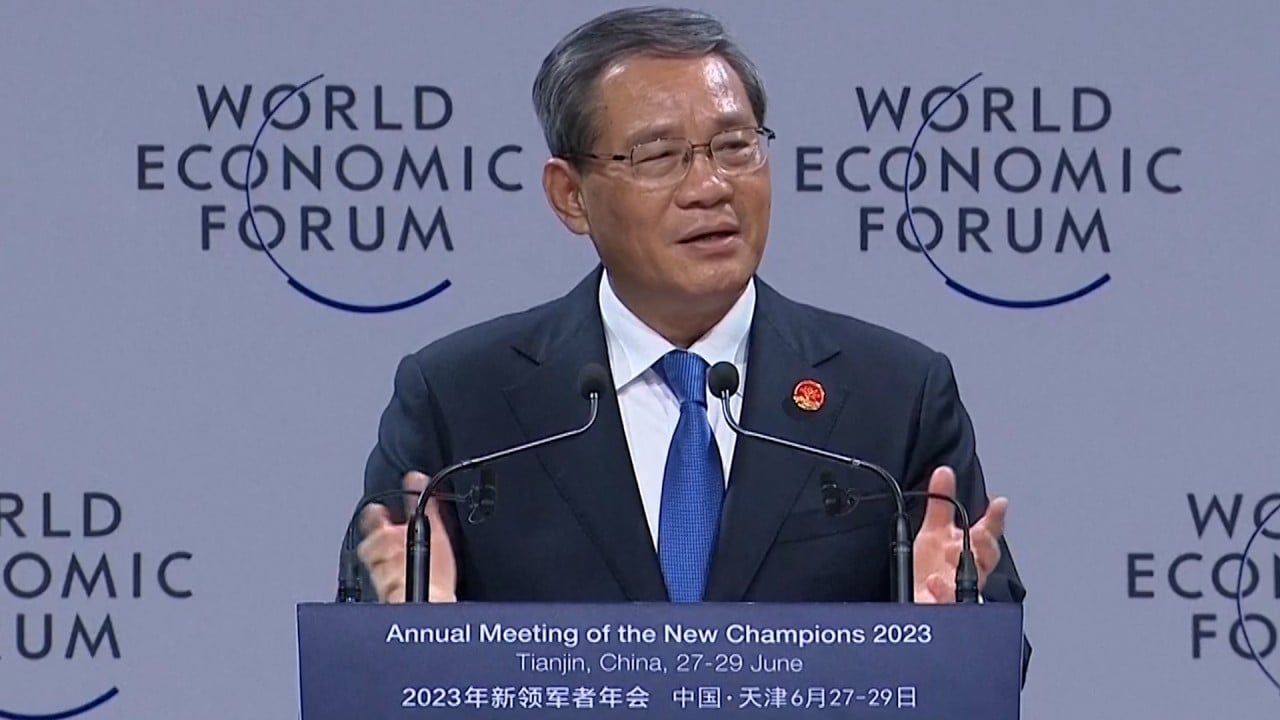
China’s 31-point plan vows private firms, like state brethren, will be ‘bigger, better and stronger’
- Days after economic figures rankled the market, Beijing unveils a list of policy solutions and promises political backing for private firms – with concrete details to come soon
- Investors and analysts have been clamouring for leaders to follow through on promises and help bring businesses back from the brink of closure or bankruptcy
In perhaps its strongest message ever to China’s private sector, Beijing has offered up solid political backing while vowing to create a favourable environment to unleash entrepreneurship that leadership sees as critical in curbing downward risks in economic recovery.
The commitments were among those unveiled on Wednesday in a new 31-point action plan that aims to shore up the ailing private sector that underpins economic growth, jobs and technological innovation, and to invigorate the national economy.
China’s economic slowdown to have ‘global repercussions’ beyond trade, IMF says
For now, however, this new action plan is the most comprehensive one released since President Xi Jinping started his third presidential term in March, and it touches on a raft of widely concerning issues such as market entry, fair competition, financing support, payment defaults, intellectual property rights and legal protection.
Despite Beijing’s determination to improve China’s business environment and to solve on-the-ground difficulties, investors and analysts want to see quick, effective and thorough action to prevent private confidence from faltering while bringing struggling businesses back from the brink of closure or bankruptcy.
Questions remain as to what impact the measures will have on economic growth, and if they will be effectively put into place, rather than mere lip service.
Tian Xuan, associate dean of Tsinghua University’s PBC School of Finance, said enforcement at all levels is vital to accomplish Beijing’s policy goals.
“More importantly, those measures must start by tackling [on-the-ground] problems,” said Tian, who was invited by Premier Li Qiang to share his suggestions at a key economic symposium in early July.
“China must address the three core problems faced by private firms: their lack of capital, confidence and stamina,” he wrote on his WeChat account.
According to the comprehensive action plan, dated July 14 but just unveiled, the private sector is regarded as an important force to promote modernisation and an important foundation for the country’s high-quality development.
Authorities reiterated vows to tear down market-entry barriers for private entrepreneurs and will conduct an assessment of market access, while accepting complaints.
“We’ll release a negative list of market intervention behaviours regularly,” the plan says. “Also, we’ll timely clean up and abolish policies that impede the unification of the market and fair competition, including local protection, market segmentation and designated transactions.”
At the end of the day, what are the concrete topics we can benefit from?”
Foreign investors and business advocates in China, who share concerns over market access and fair competition with private firms, are also closely watching Beijing’s policy moves.
“All of these 31 measurements … are something we actively promote,” said Christoph Schrempp, chair of the European Union Chamber of Commerce in China’s Tianjin Chapter.
“Beneficial policies should be much more promoted and made much more accessible for foreign companies so that they also can benefit from it, and it is often something we hear a lot,” Schrempp said, “but at the end of the day, what are the concrete topics we can benefit from?”
The action plan also vowed to improve the current mechanism to prevent payment defaults, which are often a life-or-death matter for small businesses.
Meanwhile, it pledged to create a legal environment that provides equal treatment for private entrepreneurs and protects their legitimate interests and rights.
‘Recovery is going from bad to worse’: 6 takeaways from China’s economic data
“There is no doubt that the central government and local leaders are now focusing on the economy,” said Wu Hai, founder of karaoke chain Mei KTV and a prominent voice pushing for an improved business environment. “It’s a good thing, but it will come down to implementation.”
Wu said local departments tend to welcome big companies but tend to ignore smaller players, while small businesses are generally more affected by random checks, fines and licensing issues on the ground.
“Those departments, without any responsibility for accomplishing economic goals, are the biggest shortcoming in the drive to improve the business environment,” he said.
China has more than 47 million registered private firms, a vast majority of which are small players, and more than 100 million self-employed businesses. They were hit hard by the pandemic, while some like platform companies, property developers and private tutors were also affected by Beijing’s regulatory campaigns.
But so far, their financial standing has not significantly improved this year. The profits of private-run industrial firms dropped by 21.8 per cent, year on year, in the first five months of 2023. And private investment from January-June fell by 0.2 per cent from a year earlier, compared with overall investment growth of 3.8 per cent, according to the National Bureau of Statistics.
For Teresa Chen, a partner at a small intellectual property rights consulting firm in Guangdong province, prolonged payments from domestic clients are straining corporate cash flows.
Office costs, social security and other items keep getting more expensive, and supportive policies so far have pushed businesses to spend and invest money, rather than addressing their financial hardships.
“The only preferential policy we have enjoyed is the tax cut,” Chen said. “We may either head overseas or lie flat, but seldom do we consider a business expansion in the domestic market.”
What is ‘lying flat’, and why are Chinese officials standing up to it?
Chen is a proponent of direct cash subsidies, like those given out in the United States, to help companies avoid having to downsize operations, lay off staff or default on payments to clients.
“But, to be honest, we don’t know if local authorities are willing to do that,” she added.
This is not the first time that Beijing’s policymakers have rolled out such a multifaceted plan. Back in 2005, the central government released a 36-point action plan to widen private firms’ market entry and boost their expansions.
But in recent years, private entrepreneurs have operating under concerns that they will become sidelined by state-owned enterprises that have been commissioned to become “bigger, better and stronger” national champions to compete in international markets.
Calls to eliminate private ownership gathered so much steam in 2018 that top leadership was forced to convene symposia with prominent entrepreneurs to reassure them that their roles were unchanged in China’s development blueprints.
The new action plan is part of Beijing’s broader efforts to stabilise the economy, as major ministries have been scrambling to release supportive measures to unleash consumption potential, relax property restrictions, and shore up investor confidence.
To promote fair competition, the document says Chinese authorities will take “forceful” measures to prevent the misuse of antitrust law enforcement – a matter that has haunted internet giants for the past several years.
Beijing also plans to raise the political status of private entrepreneurs, with the document encouraging them to join the country’s legislative or advisory bodies at different levels and to “play a bigger role” in international economic activities.
The private economy accounts for more than 60 per cent of the national GDP, more than 70 per cent of technological progress, and more than 80 per cent of the urban workforce. These figures have been frequently cited in government circulars to show how important the private economy is to China’s development.
The National Development and Reform Commission has also set up a regular communication channel with private firms, and three meetings were arranged with representatives of more than a dozen private firms in the past three weeks.
Speaking at a media briefing on Thursday afternoon, Li Chunlin, deputy head of the commission, said they would soon release concrete implementation details to fully invigorate private investment.
Moving forward, the action plan also advocates for a public opinion environment that encourages private firms to innovate while being more accepting of their failures.
“We should be understanding, tolerant and help [rectify private firms’] operational mistakes and failures,” it said.
Additional reporting by He Huifeng and Luna Sun




